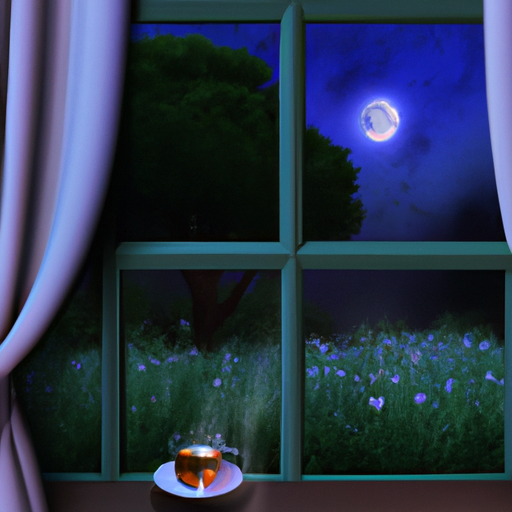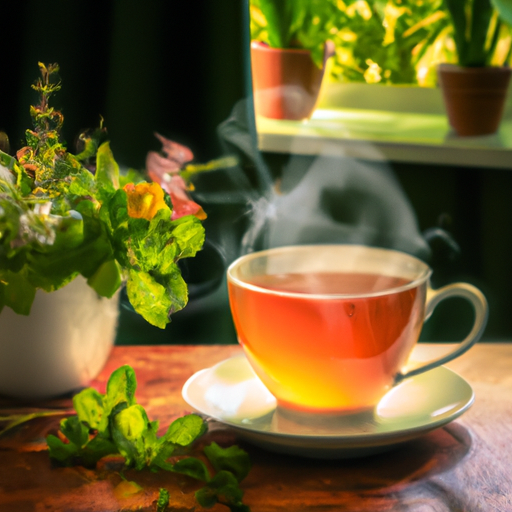Do you struggle with falling asleep and constantly tossing and turning? I have some great news for you! The key to achieving a restful night’s sleep may be as simple as sipping on a cup of herbal tea. That’s right, herbal tea is like nature’s own lullaby. Its calming and soothing effects can help you drift off to sleep quicker than you can imagine.
Now, I know what you’re thinking. How can a simple cup of tea work such wonders? Well, let me introduce you to a few herbal superheroes that will have you snoozing like a baby in no time.
We’ve got chamomile tea, the gentle giant of relaxation.
Lavender tea, the aromatic dream inducer.
And valerian root tea, the tranquilizer of the plant world.
So, grab your favorite mug and get ready for the best sleep of your life. Sweet dreams await!
Key Takeaways
- Chamomile tea has calming properties and reduces anxiety, making it beneficial for promoting relaxation and better sleep.
- Lavender tea soothes the nervous system, reduces stress, and promotes relaxation, leading to improved sleep quality.
- Valerian root tea, when taken in the proper dosage, is a natural remedy for sleep disorders and anxiety, making it a helpful herbal tea for better sleep.
- Passionflower tea relieves anxiety and interacts with brain receptors to induce calmness, making it an effective herbal tea for promoting relaxation and achieving restful sleep.
Chamomile Tea
If you’re looking for a delicious and soothing herbal tea to help you drift off into a peaceful slumber, chamomile tea is the perfect choice for you!
Chamomile tea has been used for centuries for its calming properties and is well-known for its ability to promote better sleep. One of the main benefits of chamomile tea is its ability to reduce anxiety. The tea contains compounds that bind to receptors in the brain, helping to relax the body and mind. This can be especially helpful for those who struggle with falling asleep due to racing thoughts or stress.
Another great benefit of chamomile tea is its ability to reduce inflammation in the body. This can be particularly helpful for those who experience pain or discomfort that keeps them awake at night. By reducing inflammation, chamomile tea can help to alleviate these symptoms and promote a more restful sleep.
In addition to its sleep-inducing properties, chamomile tea also has a delicious, floral taste that can be enjoyed at any time of the day. Whether you prefer it hot or iced, chamomile tea is a soothing and comforting beverage that can help you unwind and prepare for a good night’s sleep.
Now, let’s transition to the next herbal tea that can further enhance your sleep experience: lavender tea.
Lavender Tea
Lavender tea is a wonderful herbal remedy that soothes the nervous system, reduces stress, and promotes relaxation. When I sip on a warm cup of lavender tea, I can feel the tension melting away, allowing me to unwind and find peace.
The calming properties of lavender tea help to ease my mind and create a sense of serenity, making it the perfect beverage to enjoy before bed.
Soothes the Nervous System
Chamomile tea is a fantastic option for those seeking a soothing herbal remedy that can calm the nervous system and promote a better night’s sleep. In addition to its delightful taste and aroma, chamomile tea has long been used as a natural remedy for relaxation and sleep. Its calming properties can help ease anxiety and tension, making it an ideal addition to bedtime routines and relaxation techniques.
To further understand the benefits of chamomile tea for sleep, let’s take a look at the following table:
| Benefits of Chamomile Tea |
|---|
| Calms the nervous system |
| Reduces anxiety |
| Promotes relaxation |
| Aids in falling asleep |
| Enhances sleep quality |
By incorporating chamomile tea into your evening routine, you can experience the natural benefits it provides for better sleep. Furthermore, chamomile tea reduces stress and promotes relaxation, making it an excellent choice for those seeking a peaceful night’s rest.
Reduces Stress and Promotes Relaxation
Indulging in a warm cup of chamomile tea before bed can transport me to a state of tranquility, allowing stress to melt away and relaxation to take over. Chamomile tea is known for its ability to reduce stress and promote relaxation, making it an excellent choice for those struggling with sleep.
To enhance the calming effects, I often practice meditation techniques for stress reduction while sipping on my tea. Taking slow, deep breaths and focusing on the present moment helps me let go of any tension or worries.
Additionally, I find that incorporating aromatherapy into my nighttime routine further enhances relaxation. The soothing scent of chamomile helps me unwind and prepares my body and mind for a restful sleep.
Now, let’s delve into the wonderful benefits of valerian root tea.
Valerian Root Tea
To enhance your sleep quality, try sipping on a cup of valerian root tea before bedtime. Valerian root has been used for centuries as a natural remedy for sleep disorders and anxiety. Its calming properties help reduce stress and promote relaxation, making it an ideal choice for those struggling with sleep issues. Valerian root benefits extend beyond sleep, as it also helps with mood disorders and nervousness.
When it comes to valerian root tea, the dosage is crucial to achieve the desired effects. It’s recommended to start with a small amount, around 1-2 grams of dried valerian root per cup of boiling water. Steep the tea for about 5-10 minutes to extract the active compounds effectively. It’s important to note that valerian root can have a sedative effect, so it’s best to avoid driving or operating heavy machinery after consuming it.
Transitioning into the subsequent section about peppermint tea, another herbal tea that aids in sleep, it’s important to explore different options to find the one that suits you best. Peppermint tea, with its cooling and soothing properties, can be a great alternative for those looking for a refreshing bedtime beverage.
Peppermint Tea
After exploring the calming effects of Valerian Root Tea, let’s move on to another herbal tea that can help you sleep better: Peppermint Tea.
Peppermint tea is not only delicious but also offers numerous benefits for your overall well-being. One of the key benefits of peppermint tea is its ability to relax your muscles and soothe your mind, making it an excellent choice for promoting a restful sleep. The natural compounds found in peppermint, such as menthol and menthone, have a calming effect on the body, helping to reduce stress and anxiety, which are often the culprits behind sleepless nights.
Making peppermint tea at home is simple. Start by boiling water and pouring it over a handful of fresh peppermint leaves or a peppermint tea bag. Let it steep for about 5-10 minutes to allow the flavors and medicinal properties to infuse into the water. You can sweeten it with a touch of honey if desired.
Now, let’s dive into the next section about lemon balm tea, another herbal tea that can work wonders for improving your sleep quality.
Lemon Balm Tea
Immerse yourself in the soothing aroma of lemon balm tea, as its gentle embrace lulls your senses into a state of tranquility. This wonderful herbal tea has been used for centuries due to its numerous benefits and calming effects. Here are four reasons why lemon balm tea can help you sleep better:
-
Relieves anxiety: Lemon balm is known for its natural calming properties, helping to reduce anxiety and promote relaxation before bedtime.
-
Induces sleep: The sedative properties of lemon balm tea make it an ideal choice for those struggling with insomnia. It can help you fall asleep faster and enjoy a more restful night’s sleep.
-
Soothes digestion: Lemon balm tea can also aid in digestion, reducing any discomfort that may interfere with sleep. By promoting a healthy gut, it contributes to a peaceful night’s rest.
-
Reduces restlessness: If you find yourself tossing and turning at night, lemon balm tea can help calm your mind and body, allowing you to drift off into a deep and rejuvenating sleep.
As we transition into the next section about passionflower tea, let’s explore another herbal remedy that can help you achieve a peaceful night’s sleep.
Passionflower Tea
Discover the enchanting powers of passionflower tea, as it embraces your senses and transports you to a blissful state of serenity. This herbal elixir has long been revered for its ability to calm the mind and promote better sleep.
One of the key benefits of passionflower tea is its ability to relieve anxiety, making it an excellent choice for those struggling with sleeplessness caused by racing thoughts or restlessness. The natural compounds found in passionflower interact with certain receptors in the brain, helping to reduce feelings of anxiety and inducing a sense of calm.
To prepare passionflower tea for better sleep, start by steeping 1-2 teaspoons of dried passionflower leaves in a cup of hot water for about 10 minutes. You can also opt for pre-packaged passionflower tea bags, which are readily available in most health food stores. Once the tea has been steeped, strain the liquid and enjoy it about 30 minutes before bedtime. Savor the delicate floral aroma and let the soothing properties of passionflower gently lull you into a peaceful slumber.
As we transition into the next section about jasmine tea, let’s explore another herbal tea that can enhance your sleep experience.
Jasmine Tea
Indulging in a cup of jasmine tea transports me to a serene state, with its fragrant notes and calming properties. Known for its delicate and soothing aroma, jasmine tea is a herbal infusion that has been cherished for centuries.
Not only does it offer a delightful flavor, but it also provides numerous benefits for a better sleep. One of the main benefits of jasmine tea is its ability to promote relaxation and reduce anxiety. The natural compounds found in jasmine flowers have been shown to have a calming effect on the mind and body, helping to ease stress and induce a sense of tranquility. This makes it an excellent choice for those who struggle with sleep disorders or have trouble falling asleep.
Additionally, jasmine tea is rich in antioxidants, which can help protect the body against harmful free radicals and reduce inflammation. These properties can contribute to a healthier overall well-being, including improved sleep quality. Furthermore, the floral scent of jasmine tea has been known to have a therapeutic effect, helping to create a peaceful environment conducive to sleep.
In terms of flavor, jasmine tea offers a delicate and floral taste that is both refreshing and soothing. The combination of the natural sweetness of jasmine flowers and the mild bitterness of the tea leaves creates a harmonious balance that is pleasing to the palate.
Overall, jasmine tea is a wonderful herbal option for those seeking a better night’s sleep. Its calming properties, antioxidant benefits, and delightful flavor make it a holistic choice for promoting relaxation and achieving a restful slumber.
Frequently Asked Questions
Can herbal teas like chamomile or lavender interact with medications used for sleep disorders?
I investigated the potential risks of herbal tea and sleep medication interactions. While chamomile and lavender are generally safe, it’s important to consult with a healthcare professional to ensure there are no adverse effects.
How long before bedtime should I drink herbal tea to help improve my sleep?
The best time to drink herbal tea for better sleep is 30-60 minutes before bedtime. Chamomile and lavender are the best herbal teas for improving sleep, promoting relaxation and reducing anxiety.
Is it safe to consume herbal teas like valerian root or passionflower tea on a regular basis?
Regular consumption of herbal teas like valerian root or passionflower tea may have long-term effects on sleep quality. However, it’s important to consider alternatives such as creating a bedtime routine or practicing relaxation techniques for better sleep.
Can herbal teas like peppermint or lemon balm tea be used to alleviate other sleep-related issues, such as insomnia or restless leg syndrome?
Herbal teas like peppermint and lemon balm can be effective in alleviating sleep-related issues such as insomnia or restless leg syndrome. Scientific evidence supports their use as natural remedies for sleep disorders.
Are there any potential side effects or risks associated with consuming herbal teas for sleep?
Potential risks associated with consuming herbal teas for sleep include allergic reactions, interactions with medications, and gastrointestinal issues. It’s important to consult a healthcare professional before using herbal tea alternatives for better sleep.
Conclusion
So there you have it, folks! After delving into the world of herbal teas, it’s clear that they hold the key to a peaceful slumber. From the calming chamomile to the soothing lavender, these natural remedies are here to save the day (or night, rather).
So forget counting sheep, just grab a cup of herbal tea and let Mother Nature work her magic. Who needs sleeping pills when you have a pantry full of botanical wonders?
Sleep tight, my friends, and may your dreams be as serene as a field of chamomile.










